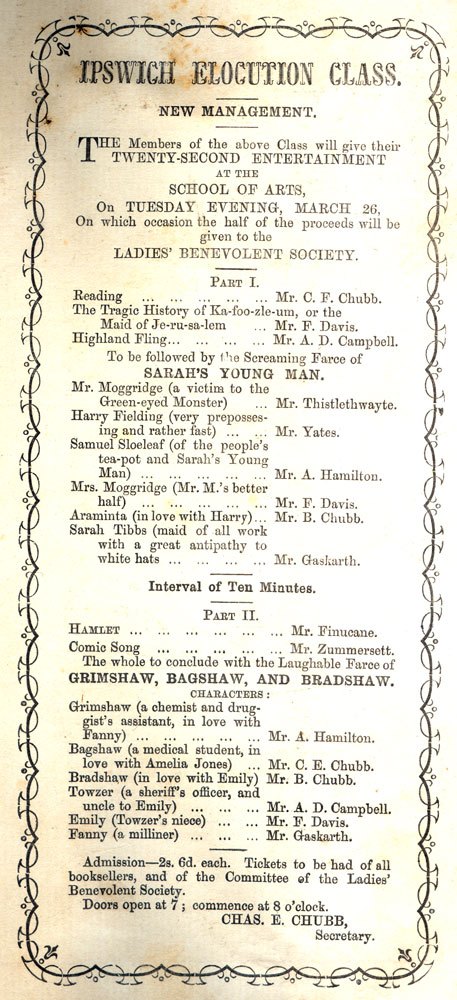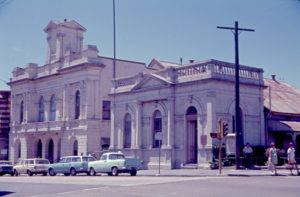Soon after settlers arrived and 10 years before Ipswich became a municipality in 1860, a School of Arts was proposed in town thus proving that the people of Ipswich have always valued books & reading. This institution has evolved through a number of name changes and locations but has remained a meeting place for Ipswichians. Ipswich Libraries descends from these humble roots.
It all started with the Ipswich Subscription & Literary Institute in 1850. Benjamin Cribb was the president of the group. Their base was initially at the corner of Brisbane Street and Wharf Streets, but would move to a small room in a wooden cottage further up Brisbane Street (where London Pharmacy would later stand) that was Mr Beattie’s bookselling and stationery business. This site would also become S.F. Whitehead’s stationer’s shop in later years.
In 1858 the Ipswich Subscription & Literary Institute became the Ipswich Mechanics’ School of Arts and was subsequently housed in the disused wooden court house, situated on the former Police Court Reserve. Using a government grant and loan a fine new building was constructed and opened in 1865. This was what we know as the old town hall, now occupied by the Ipswich Art Gallery. The School of Arts remained here for the next 70 years or so and was a well-known establishment and cultural venue. Probably because it was a landmark, Mr John McDonald applied for a publican’s licence in 1876 to open a new hotel in Brisbane Street to be called the School of Arts Hotel.
From the outset the institution included a small collection of books, a reading room, and literary or educational lectures. The Ipswich Horticultural Society held its first exhibition in the School of Arts in December 1868. George Bashford, a political candidate for the Legislative Assembly attracted 600 people to a meeting held there on Tuesday 7 August 1883. The School of Arts was also the scene of musical entertainments, eisteddfods, poetry readings, and dramatic performances. In 1874 Zelindra Company performed horizontal bar work and trapeze act and the Ipswich Amateur Opera Company performed the Pirates of Penzance in 1897. At one stage in 1904, several entertainments were to be held to pay for a new catalogue for the School of Arts including “an illustrated lecture” on the war in the Far East by Reverend C.E. James of Brisbane. The local chess team played matches there for decades. Ipswich Parliamentary Class met for over 30 years in the School of Arts while the Elocution Class was a regular occurrence on the premises in the early years.

Program from Ipswich Elocution Class Entertainment, Ipswich, Tuesday 26 March, 1867 – Image courtesy of Picture Ipswich
Despite its conservatism the Ipswich School of Arts was the scene of a riot on the evening of Thursday 5th November 1874. This unlikely and violent event was widely reported in provincial and city newspapers across Australia in the days that followed, including the South Australian Advertiser & Maitland Daily Mercury (NSW). Reverend D. Porteous was scheduled to deliver the last in a series of lectures on “The monk that shook the world”. It seems that this subject must have been somewhat contentious as the chairman James Foote appealed for order and the reverend claimed the right of free speech even before the lecture commenced. A large audience was in attendance. Stones were thrown and chairs were broken. Two men were doused with kerosene when the chandelier was broken and a fire broke out. Men fought inside and Mr R. Gill the postmaster was struck with a whip outside. There were several head injuries and Denis Toohey was stabbed. A very exciting night in the old town although it is still not clear why a riot occurred or why the lecture by Reverend Porteous was considered objectionable.
The School of Arts was managed by a committee of usually prominent townsfolk like businessmen and councillors. Membership was by subscription. Monthly meetings were held to monitor progress and expenditure. New books, mostly classics and “standards” with some “light reading” dribbled onto the shelves at a very sedate pace however by 1908 the collection numbered between 8000 and 9000 items.
In 1921 the School of Arts moved to the top floor of the Soldiers Memorial Hall in Nicholas Street where it would stay for about the next 30 years until moving yet again to the old Bank of Australasia building on the corner of Brisbane & Nicholas Streets. By then the School of Arts was named Ipswich Municipal Library and its management transferred to Ipswich City Council.

Ipswich Art Gallery and old Bank of Australasia building, Brisbane Street, Ipswich, 1970 – Image courtesy of Picture Ipswich
Information taken from:
Queensland Times, 26 February 1919, p.2.
Queensland Times, 29 January 1949, p.4.
Queensland Times, 24 November 1950, p.2.
Queensland Times, 22 July 1920, p.2.
Queensland Times, 25 June 1947, p.2.
Queensland Times, 15 February 1951, p.2.
Queensland Times, 6 March 1933, p.3.
Queensland Times, 7 April 1908, p.4.
Queensland Times, 6 November 1952, p.2.
Queensland Times, 29 November 1921, p.6.
Queensland Times, 14 July 1948, p.2.
Queensland Times, Ipswich Herald and General Advertiser, 3 October 1865, p.3.
Queensland Times, Ipswich Herald and General Advertiser, 22 April 1876, p.4.
Queensland Times, Ipswich Herald and General Advertiser, 9 August 1883, p.4.
Queensland Times, Ipswich Herald and General Advertiser, 1 October 1904, p.11.
Telegraph (Brisbane), 7 November 1874, p.3.

